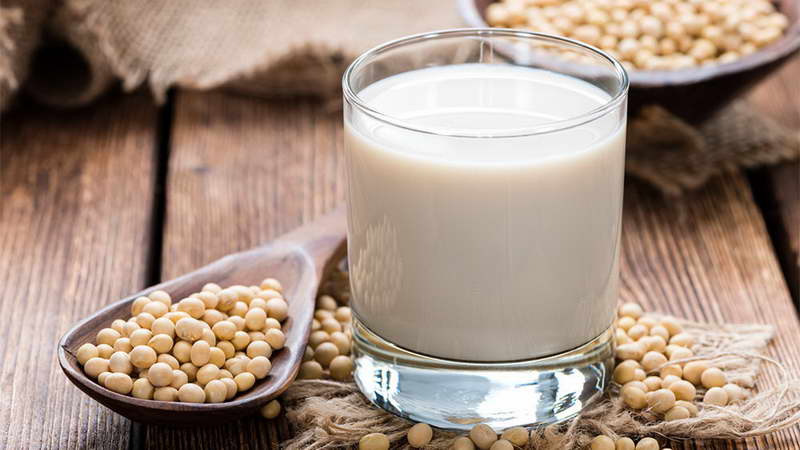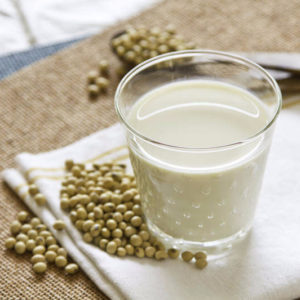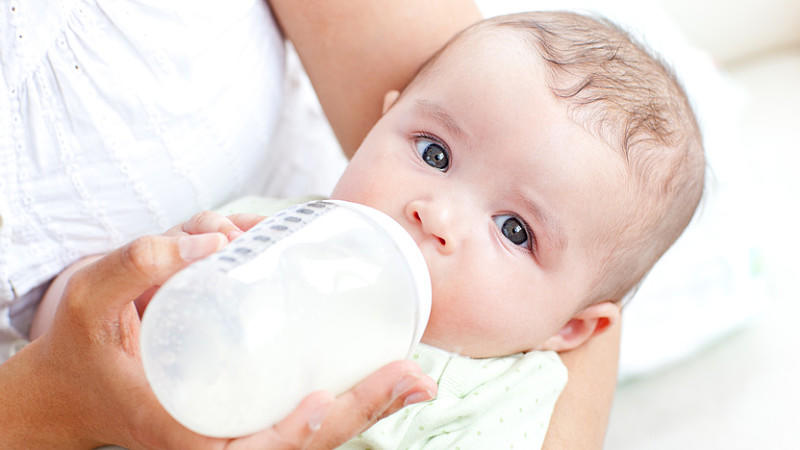Can soy and soy milk be consumed while breastfeeding?
Breastfeeding is a crucial period in a woman's life. The health and full development of the child depends on how balanced and varied her diet is. Soy and soy products are in great demand among adherents of proper nutrition and those who are allergic to cow's milk proteins. Therefore, the benefits and harms of soy products during gestation and breastfeeding is an important question, the detailed answer to which read on.
The content of the article
Is it possible to use soy milk and soy for HS

Products made from or with soy are found in the daily diet of many people. Most semi-finished meat products, sausages, sausages, dairy products contain vegetable components, in particular soy. Manufacturers thus seek to reduce the cost of products.
Soy itself is not only harmless, but also usefulif consumed in moderation. All plant foods are potentially allergenic, and soy is no exception. Therefore, women who have ever experienced allergies should be careful when consuming soy and its products.
During pregnancy
Is it possible soy pregnant? When deciding whether to include a particular ingredient in the diet, they are guided by a balance between benefits and possible harm. In the case of soybeans, the benefits are undeniable: this plant is capable of replacing animal protein, diversifying the cuisine, and enriching the body with vitamins and minerals.
The harm from eating soy products is minimal, but it should be taken into account by those who have problems with blood pressure, thyroid gland and urinary system.
During pregnancy, the diet is under the supervision of a physician. Therefore, before introducing any product, a specialist consultation is required.
Composition, properties, contraindications

Soy milk as opposed to beans contains few calories - only 45 kcal per 100 g. This is due to the fact that 90% of the product consists of water.
Chemical composition of soy milk (per 100 g):
- proteins - 2.94 g;
- fats - 1.99 g;
- carbohydrates - 3.45 g (including sugar - 2.5 g);
- fiber - 0.4 g
Soy milk contains vitamins of group B, C, E, D and minerals: calcium, potassium, sodium, selenium. The low glycemic index (30 units) makes this product safe for diabetics and for intensive weight gain during pregnancy.
The benefits of soy milk and soy products are in a unique protein that can replace animal... In terms of its amino acid composition, it is close to the proteins found in meat and chicken eggs.
The fats of soy products contain saturated and unsaturated acids, similar to those found in seafood Omega-3 and Omega-6.
Eating soy milk, tofu, or soy meat substitutes in moderation is beneficial for the body. However, for some women, especially during pregnancy, soy products are contraindicated.
It is not recommended to use it when:
- diseases of the thyroid gland, since the phytohormones contained in the product can lead to hypothyroidism, which is the cause of disorders in the development of the fetus;
- hypotension - regular consumption of soy products lowers blood pressure;
- food allergies;
- urolithiasis, because.soy causes increased production of oxalates, which tend to form kidney stones.
For healthy women during pregnancy, consuming soy milk or products made from these beans is not only acceptable, but also beneficial in reasonable amounts.
It is interesting:
Is it possible to introduce cauliflower into the diet while breastfeeding
Benefit and harm
Soy foods are easier for the body to digest than animal proteins. They are low in calories and lack lactose and cholesterol.
For mother
A woman during gestation may experience an aversion to meat products, manifested in severe toxicosis. In this case, soy products are used to replenish the protein deficiency.
Excess weight during pregnancy is dangerous for the health of the expectant mother and fetus. Thanks to their good digestibility, soy and its derivatives help keep weight under control.
The vitamin complex has a beneficial effect on the woman's body, since it maintains the health of the nervous system, strengthens the immune system. Calcium-rich soy foods prevent teeth decay and keep bones strong.
However, the isoflavones found in soy products have a negative effect on the thyroid gland, reducing the production of hormones. This can lead to the development of hypothyroidism, which is fraught with the threat of miscarriage.
For a child
The high content of vitamin E contributes to the normal development of the fetus, prevents spontaneous abortion.
Potassium, magnesium and calcium help to properly form the skeletal system, and B vitamins help the brain and nervous system.
Protein helps to build muscle mass, and polyunsaturated fatty acids prevent the risks of developing congenital brain pathologies.
The phytohormones contained in soy products carry a certain risk, they can provoke abortion. In addition, like any plant food, soy can form an allergic predisposition in a child.
Rules for use during lactation

The diet of a nursing woman is significantly different from that of a pregnant woman. What was safe during gestation can cause problems with breastfeeding. Therefore, during lactation, doctors recommend adhering to three important principles: caution, gradualness and observation.
In the first 2-3 months of a baby's life, the diet of a nursing mother is very strict. This is due to the fact that the child's gastrointestinal tract is still developing. He reacts sharply to the slightest changes in breast milk. Improper nutrition of the mother can cause colic, constipation, diarrhea, allergic reactions, sleep disturbances, and anxiety in the baby.
Therefore, besides the products permitted by the pediatrician, a nursing woman cannot eat anything else.
How and when to introduce into the diet
Three months after giving birth, you can begin to introduce new products no more than one in 2-3 days in small quantities, and better in the morning. Next, you need to observe the child. If something bothers him or rashes appear, the product is excluded from the diet. Soy milk and soy products can also be included in the menu of a nursing mother no earlier than three months after giving birth. In exceptional cases - intolerance to milk protein or allergic reactions to meat products - with the permission of the pediatrician, soy milk and soy products are introduced.
Important! In case of intolerance to cow's milk, "artificial" people use infant formula based on purified, genetically unmodified soy protein for their nutrition. However, such mixtures should also be prescribed by a pediatrician.
What time of day and how much to drink
So that soy milk does not harm the baby, they begin to take it in a quarter of a glass. The best time to introduce into the mother's diet is in the morning.If the child does not feel discomfort, after three days the dose is increased to half a glass, after a week you can drink a full portion - 200 ml. This is the maximum daily allowance for soy milk while breastfeeding.
Important! If there are signs of an allergic reaction, you should return to the previous menu.
Can I give a child

Soy milk is allowed for baby food from 2.5-3 years old. It is used in the same way as cow - as an independent dish or for making cereals, omelets, milk soups, breakfast cereals.
Soy kefir is too poor in calcium and vitamins compared to traditional one. Therefore, it is more often used to feed children in vegetarian families. Unlike kefir from cow's milk, soy is included in the diet later - at the age of 4-5 years.
During the same period, you can give children tofu cheese. Since it does not have its own flavor, it is more appropriate to include it in salads.
Soy products that replace meat are allowed for baby food from 5 years of age. However, since such dishes have a neutral taste, food additives, sauces and dressings are used in their preparation. Such a cuisine is harmful to the health of young children, therefore it is not recommended to include soy meat in their diet.
In what form to use
Soy milk is a separate dish. But you can add berries and fruits to it. Smoothies, cocktails, mousses, puddings are made on the basis of milk.
Soy milk and soy recipes for new mothers
In order to diversify the menu and not harm the child, a simple rule is followed when preparing soy dishes: the fewer ingredients, the better.

For pancakes with soy milk take:
- soy milk - 1.5 tbsp.;
- vegetable oil - 2 tbsp. l .;
- baking powder - 1 tsp;
- vanilla sugar and honey - 2 tsp each
- flour - 1.5-2 tbsp.
All ingredients are mixed until smooth. The dough should be like thick sour cream in consistency. Put the dough with a tablespoon in a well-heated, oiled frying pan. After browning on one side, turn over and fry until tender.
Pancakes are also made from this dough. In this case, the dough is laid out in a dry, well-heated frying pan (without oil), covered with a lid and fried for 1-1.5 minutes. Then turn over and bring to readiness without a lid.
Such pancakes are served with honey, melted butter or jam.
Important! If the child is allergic to sweets, it is better to exclude jam.
For a green omelet you will need:
- chicken eggs - 3 pcs.;
- soy milk - 0.5 tbsp.;
- any greens - 1 bunch;
- salt, sugar - to taste;
- vegetable oil for lubricating the mold.

Beat eggs well with milk, add salt, sugar and finely chopped herbs (dill is best, since it does not change the taste of breast milk as much as parsley or green onions). Grease a baking dish or pan. The resulting omelet mixture is poured into it and placed in a preheated oven over medium heat for 30-40 minutes.
The omelet is served with canned or stewed vegetables. You can also eat it as an independent dish.

For a salad with tofu cheese take:
- tofu cheese - 100 g;
- green apple - 1 pc.;
- banana - 1 pc.;
- sour cream - 2 tbsp. l.
Fruits and cheese are cut into small cubes, mixed and seasoned with sour cream.
Conclusion
Soy milk and soy products are rich in vitamins, amino acids, useful microelements. They are suitable for pregnant and lactating women with no health problems. However, gestation and breastfeeding are very crucial periods, so any change in the diet should be agreed with the doctor.
If you have kidney or thyroid problems, blood pressure, or allergic reactions, soy foods should not be used in the diet of a nursing or pregnant woman.